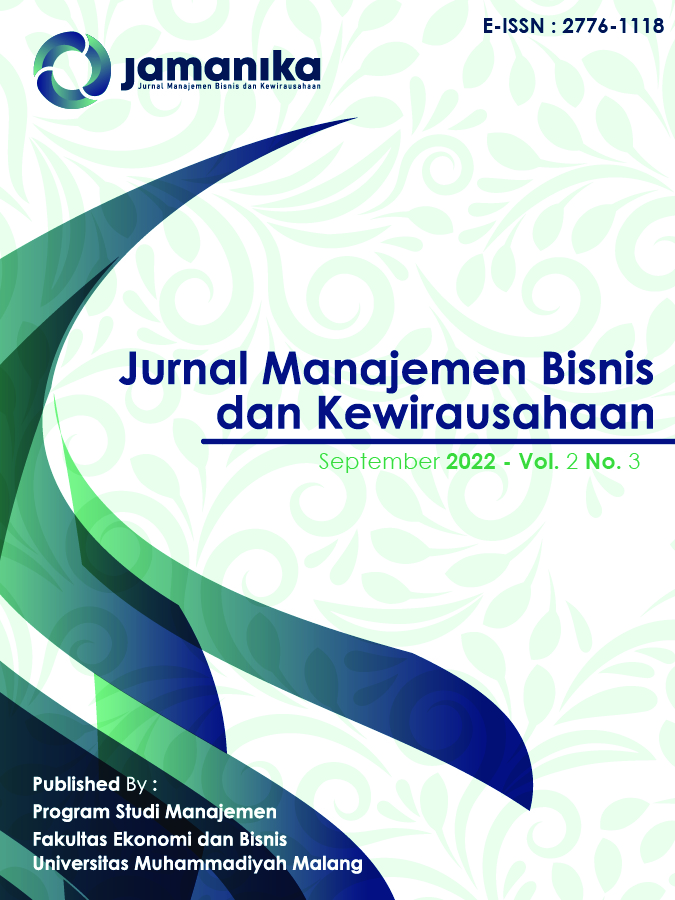The Effect of Self-Efficacy and Locus of Control on MSME Entrepreneurs’ Performance
DOI:
https://doi.org/10.22219/jamanika.v2i03.22983Keywords:
locus of control, enterpreneur performance, self efficacyAbstract
This study aims to determine the effect of self-efficacy and locus of control on the performance of MSME entrepreneurs. This research was conducted on entrepreneurs who have been in business for more than 5 years with a sample of 100 respondents. The analysis technique used in this research is the multiple linear regression analysis technique. The results showed that the variables of self-efficacy, locus of control, and entrepreneur performance were high, judging from the range of the scales, the scores were very high. The results of the regression analysis of self-efficacy and locus of control each have a partial and simultaneous effect on the performance of entrepreneurs, the self-efficacy variable is the variable that has the most influence on the performance of entrepreneurs in SMEs in the Gandusari district.
Downloads
References
Bandura, A. (1994). Bandura Self-Efficacy Defined. Retrieved from Encyclopedia of Human Behavior website: http://www.uky.edu/~eushe2/Bandura/BanEncy.html%0D
Bangun, W. (2012). Manajemen Sumber Daya Manusia. Jakarta: Erlangga.
Baron, R. A. & J. G. (1990). Behavior in Organization: Understanding and Managing the Human Side of Work (Third). Toronto: Allyn and Bacon.
Bello, A. T. (2001). Validating Rotter’s, 1966, Locus of Control Scale With a Sample of Not For Profit Leader. Management Research News, 24, 25–34.
Benedicta, P. (2003). Kewirausahaan Dari Sudut Pandang. Psikologi Kepribadian. Jakarta: Grasindo.
Beukman, T. L. (2005). Locus of Control: To Lead or To Be Lead. University of Pretoria.
Cassel, C., et al. (2002). Exploring Human Resource Management Practices in Small and Medium Sized Entreprises. Personnel Review, 31(6), 671–692.
Engko, C. (2008). Pengaruh Kepuasan Kerja Terhadap Kinerja Individual dengan Self Esteem Dan Self Efficacy Sebagai Variabel Intervening. Jurnal Bisnis dan Akuntansi, 10(1), 1–12.
Entrialgo et al. (2000). Linking entrepreneurship and strategic management: evidence from Spanish SMEs. Technovation, 20(8), 427–436.
Green, J. et al. (1996). The Russion Entrepreneur: a Study of Psychological Characteristics. International Journal of Entrepreneurial Behavior and Research, 2, 49–58.
Hisrich, R. et al. (2005). Enterpreneurship. New York: McGraw-hill Inc.
Kreitner, R. & Kinicki, A. (2005). Perilaku Organisasi. Jakarta: Salemba Empat.
Luthans, Fred & Peterson, S. . (2002). Employee Engagement and Manager Self-Efficacy: Implications for Managerial Effectiveness and Development. Journal of Management Development, 21, 376–387.
Patten, M. D. (2005). An Analysis of The Impact of Locus of Control on Internal Auditor Job Performance and Satisfaction. Managerial Auditing Journal, 20, 1016–1029.
Pillai, R. & E. W. (2004). Transformational Leadership, Self- Efficacy, Group Cohesiveness, Commitment, and Performance. Journal of Change Management, 17, 144–159.
Purnama et al. (2010). Motivasi dan Kemampuan Usaha dalam Meningkatkan Keberhasilan Usaha Industri Kecil. Jurnal Manajemen Dan Kewirausahaan, 12(2), 177–184.
Strauss, J. . (2005). Multisource Perspective of Self-Esteem, Performance Ratings, and Source Agreement. Journal of Managerial Psychology, 20, 464–488.
Suryana. (2014). Kewirausahaan. Jakarta: Salemba Empat.
Sutradawanti. (2018). Pengaruh Self Efficacy dan Motivasi Terhadap Keberhasilan Wirausaha UMKM Bakso di Kota Bandung. Universitas Pasundan.
Taormina, R.J. & Lao, S. K. (2007). Measuring Chinese Entrepreneurial Motivation: Personality and Environmental Influences. International Journal of Entrepreneurial Behaviour & Research, 13(4), 200–221.







